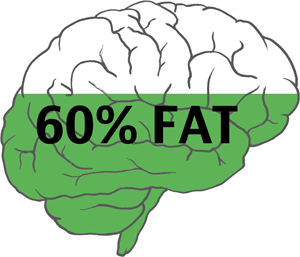Let’s start with:
1. You are what you eat
The first thing you should know about the brain is that it’s made up of 60 percent fat.
This means that the more good fat we can put into our bodies, the better it will be for our brain health. Some foods with good fat include: mackerel, herring, sardines, anchovies, tuna steak, salmon, flaxseeds, pumpkin seeds, chia seeds, sunflower seeds, sesame seeds, walnuts, omega 3 rich eggs Simple enough right? Once you have this part down, it’s just about keeping the bad stuff (i.e. sugar, bad fat, drugs) out of the brain.
2. Socialize it off
A laugh a day keeps the doctor away? Being around people you enjoy is a great way to keep your brain healthy. When you’re laughing and smiling, your brain releases “feel-good” chemicals, such as Dopamine. In a study of 2,249 California women published in the July American Journal of Public Health, researchers reported that older women who maintained large social networks reduced their risk of dementia and delayed or prevented cognitive impairment. The message is clear: form bonds instead of walls. Come together, instead of isolating from one another.
3. Learn another language
Speaking of socializing, a great way to get your social life going while learning a new skill is to learn a language. We’ve written extensively on the benefits of learning a language, but here are the highlights: i. Enhances your focus ii. Improves your native languages iii. Prevents common brain diseases In fact, learning a new language can prevent or delay Alzheimer’s disease and dementia by 4.5 years. This is a far more powerful than the best drugs which only delays the symptoms by 6–12 months.
via Sunbelt Staffing The best method to reap the benefits of socializing and learning a language is not using a software solution, like Duolingo or Rosetta Stone, but by speaking it with native speakers. This allows you to learn a new language while learning about the different cultures of people around the world. We all have time to learn something new, and it starts with reprioritizing your schedule for self development.
4. Sweat it off
This one should come with no surprise. If you’re doing any sort of exercise, you’re already ahead of the game. But Mark McDaniel, PhD, professor of psychology at Washington University in St. Louis, suggests “a combined program of aerobics and weight training. Studies show the best outcomes for those engaged in both types of exercise.” So if you’re doing just weight training or just aerobic fitness, it could be worth your while to switch it around once in awhile.
5. Plan for the future
Whether you’re twenty-five years old or about to retire, maintaining a strong sense of purpose for the future is a necessity for keeping your brain alert and healthy. Studies show that when individuals were simply planning a trip (i.e. booking a flight ticket), they reported higher levels of dopamine in their brain. This means that just planning for the future alone can be beneficial to your brain, even if you never take that trip. Having something to look forward to is what helps us maintain optimism, which is essential for our brain and overall health. Continue to improve yourself, develop new skills, and never stop learning. It may just save your life.
Over to you
What do you think about these healthy brain activities? Is there something that we missed? We’d love for you to share this with your friends and family members!

